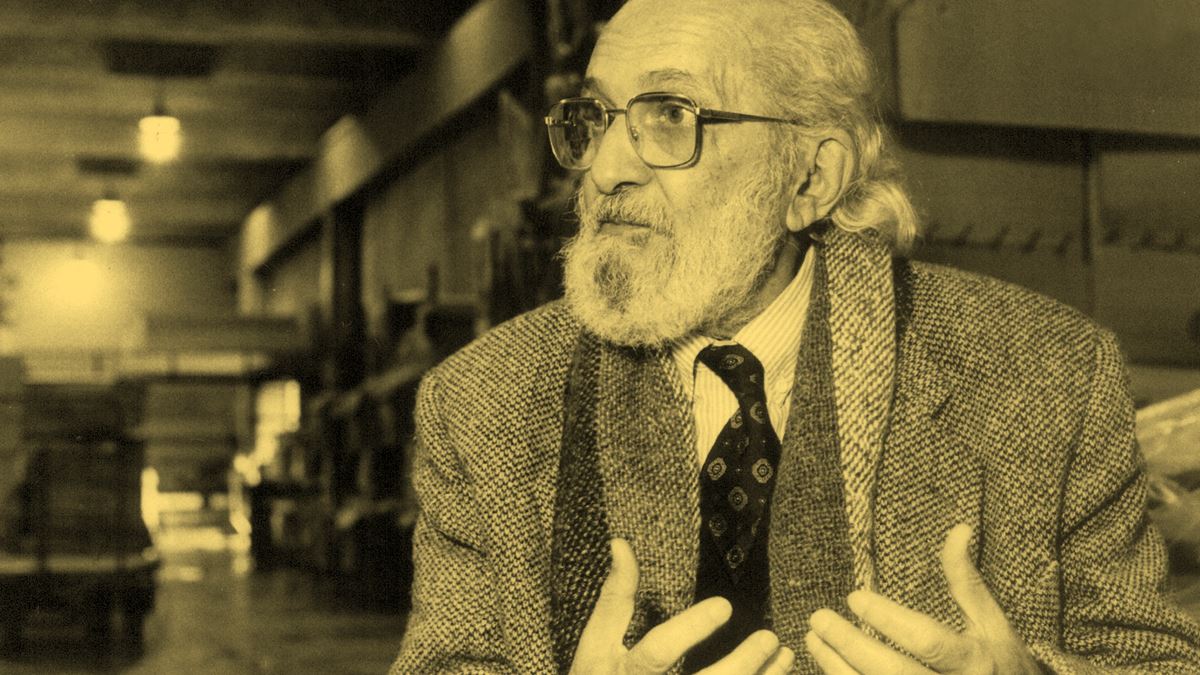The career of Paulo Reglus Neves Freire (1921–1997)—who authored the third most quoted humanities book in the world—spans a literacy program in Angicos, Rio Grande do Norte, and the role of Secretary of Education for the city of São Paulo and includes stints at Harvard University in the United States and the Department of Education of the World Council of Churches (WCC) in Geneva, Switzerland. His 100th birthday, which falls in September, has inspired researchers to discuss an intellectual project with a conceptual framework based on his experiences educating young people and adults.
The youngest of four brothers, Freire was born in Recife, in the state of Pernambuco, to a housewife and a Pernambuco Military Police officer. Educator Targélia Ferreira Bezerra de Souza Albuquerque—who holds the Paulo Freire Chair at the Federal University of Pernambuco (UFPE)—points out that, during Freire’s childhood, his family’s solid financial situation could be credited to some help from a relative. With the 1929 crash, the family had to move to the town of Jaboatão dos Guararapes, where they experienced poverty and hunger. Thanks to a scholarship, however, Freire was able to finish his basic education at Colégio Oswaldo Cruz, attended by many members of the Recife elite. In 1943, he was accepted to the Recife Law School and was also asked to teach at the institution where he obtained his basic education. When he graduated, in 1947, “the prospect of working as a lawyer” was at odds with Freire’s job as a teacher—as described by educator Sérgio Haddad, from the NGO Ação Educativa, in his book O educador – Um perfil de Paulo Freire (The educator: A profile of Paulo Freire) published by Todavia. The book was the culmination of research begun two years earlier. Freire’s law career was short-lived. Albuquerque—who is also a member of the Paulo Freire Center for Studies and Research at UFPE—shares that one of Freire’s first assignments working at a law firm was to collect a debt from a dentist, who had incurred it when acquiring work tools. “Upon seeing that the dentist’s office was his only means of supporting himself, Freire gave up on collecting the debt. He then quit law and began teaching full time.”

Paulo Freire Institute
The educator (center, in a white jacket) with a graduating class from the SESI Education and Culture DivisionPaulo Freire InstituteAround that same time, Freire was asked to work in the Education and Culture Division of the recently-established Industry Social Services (SESI), where—alongside a team of educators—he developed a project was aimed at learning more about individuals living in extreme poverty. “Freire realized that these people needed to expand their understanding of the world and themselves in order to comprehend situations of oppression,” shares the UFPE researcher. In parallel with his work at SESI, Freire and his wife Elza Maria Costa de Oliveira (1921–1986), a teacher and mother of his five children, joined Christian groups that would develop projects on the emancipation of workers and adult individuals from marginalized communities.
In 1959, he defended a thesis as part of a competition to become a full professor of philosophy of education at the University of Recife (now UFPE). While he did not get the job, he was eventually appointed professor of history and philosophy of education at the School of Philosophy, Sciences, and Languages and Literature, at that same institution. Titled “Education and Brazil’s current situation,” his thesis defended that Brazil was experiencing a unique moment, when the masses were gaining the opportunity to participate in the national development movement. “It was during these formative years—with his work at SESI, his activities with Catholic organizations, and his work at the University of Recife—that Freire laid the foundations of his thoughts on education and philosophy,” says Albuquerque.
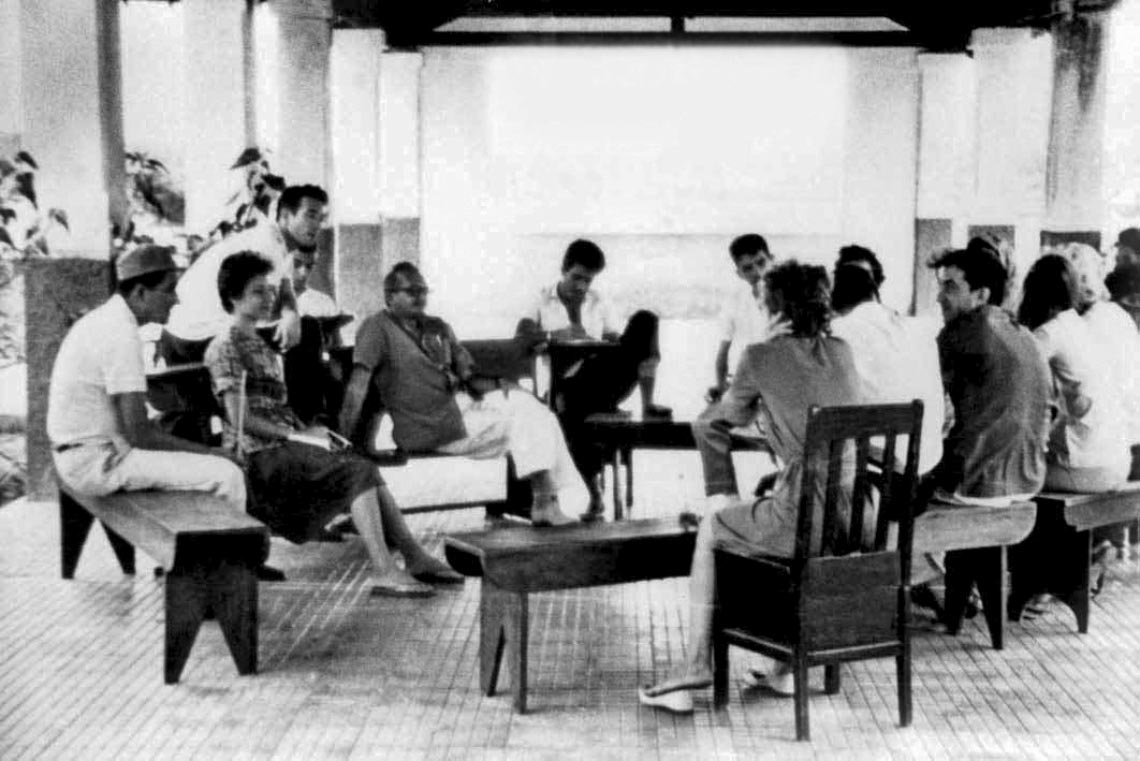
Paulo Freire Institute
Right, training educators in Angicos, Rio Grande do NortePaulo Freire InstituteBrazil had, up until that point, been unsuccessful at reducing rates of illiteracy—especially in adult populations. Data from Brazil’s Ministry of Education (MEC) show that, in the 1960s, 15.9 million people over the age of 15, or 39.6% of the population, could not read and write. “Traditionally, Brazil’s adult literacy campaigns were identical to those aimed at children. Freire adapted them for adults,” explains Haddad. His method was based on associating images to words, incorporating the students’ life experience in the process of learning to read and write, and prioritizing topics of interest to them. From the late 1950s to the early 1960s, Freire and his team at SESI applied his method to projects developed in towns in the states of Rio Grande do Norte and Paraíba.
Around that same time, Catholic organizations such as the Episcopal Conference of Brazil (CNBB), were also developing literacy and education campaigns for the lower classes. “Freire’s methodology, which included approaching the reality and the language of the adults he wanted to teach, was perfect for other organizations that were also implementing educational projects focused on vulnerable populations,” says Haddad. Haddad also points out Freire’s closeness with groups linked to liberation theology, a movement within Catholicism that emerged in Latin America in the 1960s for the liberation of the poor.

Paulo Freire Institute
A student holding his daughter points out syllables during a literacy course, in 1963Paulo Freire InstituteBiologist Juliana Rezende Torres, a member of the Paulo Freire Study Group at the Federal University of São Carlos (UFSCar), explains that Freire believed young people and adults already had a kind of reading of the world, despite not knowing how to literally read and write. “Freire argued that, in acquiring literacy, the reading of reality comes before the writing of words,” she says. Thus, he would identify the most significant words for each group, which he called “generating words”—such as brick or wall for construction workers—and then developed the process of acquiring literacy from those words. “He developed a concept of liberating education, which is opposed to the traditional concept of education, where the teacher holds all the knowledge and pours it into the student,” she explains.
In 1963, based on his pioneering experiments, Freire created a 40-hour project, alongside a University of Recife team, to teach 300 agricultural workers in Angicos to read and write—an effort promoted by the state government and the University Cultural Outreach Service. “The initiative had the goal not only to teach them how to read and write, but also to make them aware of their rights as citizens and help them develop a critical view of the world,” says Albuquerque. Haddad shares that, at the end of the course, all students knew how to write their own names. Educator Marcela Gajardo, from the Latin American School of Social Sciences (FLACSO) in Chile, points out there was some criticism to Freire’s method. “Some researchers rightly maintain that Freire’s method was more effective at teaching people how to vote than how to read and write. At that time, most Latin American countries required literacy in order to vote,” says Gajardo.

Paulo Freire Institute
In 1963, while accompanied by Paulo de Tarso Santos (light-colored jacket), then Minister of Education, Freire (wearing glasses) listens to a student during a classPaulo Freire InstituteHistorian Flávio Henrique Albert Brayner, a retired UFPE professor, believes there is some ambiguity in the adult literacy projects that rely on Freire’s method. “At face value, the generator words have no critical meaning for the communities. It is Freire’s methodology that gives them such meaning. In their effort to liberate the oppressed, he and his staff also ended up assuming a position of authority over them. That is why I say that, behind a pedagogy for liberation, lurks a desire for power.” In Brayner’s assessment, Freire’s work echoes a question formulated in the 1920s by modernist intellectuals, such as Mário de Andrade (1893–1945), about the search for the genuine Brazilian identity. “This search was at the heart of Brazil’s intellectual history until the mid-1950s, when it was believed that a national project should include the people, not just the elite,” he explains. The historian believes Freire incorporates these discussions by proposing an educational method for the nation’s development that included the lower classes.
Similarly, anthropologist Eduardo Dullo, of the Federal University of Rio Grande do Sul (UFRGS), believes that Freire’s goal was to use literacy to transform the mentalities of these communities. “His approach results from a diagnosis of Brazil’s situation at that time, when it was believed that the people did not have the mental capacity to exert their rights in a democracy,” he says, explaining why Freire’s methodology emphasized the development of critical thinking and notions of citizenship beyond the issue of literacy. While he acknowledges the importance of this effort, Dullo also points out the dynamics of authority between Freire and his team and the communities they taught. “Their goal was teaching students to read and acquire autonomy to think about their situation, but this took place through a vertical relationship between student and teacher using political concepts. This is a kind of pressure that cannot be resolved,” he says.
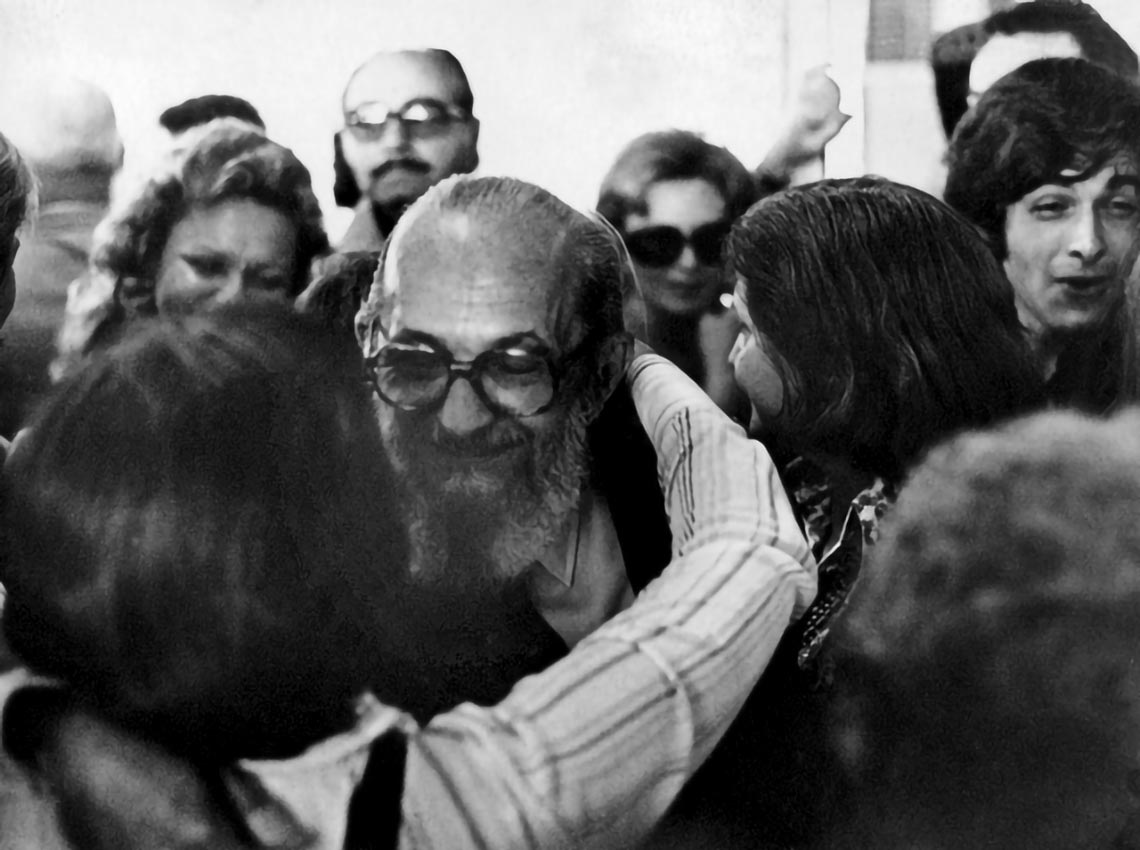
Paulo Freire Institute
Returning from exile, in 1980Paulo Freire InstituteDullo believes that the idea of studying the communities prior to teaching them, to identify the generating words, is related to Freire’s readings of the work of Polish anthropologist Bronislaw Malinowski (1884–1942). “However, in anthropology, we seek to learn from the worldview of a given population and change our way of thinking, unlike the approach to literacy developed by Freire, whose ultimate goal was to transform those individuals,” compares Dullo. For his PhD, obtained in 2013 from the National Museum of the Federal University of Rio de Janeiro (UFRJ), Dullo developed research on Freire’s career to discuss how Brazilian society changed from 1920 onwards.
In 1964, as part of the National Literacy Program (PNA), Freire was asked by then Minister of Education and Culture Paulo de Tarso Santos (1926–2019) to expand his literacy project to include the whole country. Their initial goal was teaching five million people how to read and write. However, that same year saw a military coup and the extinction of the PNA; Freire was then forced to leave the country. He went into exile in Bolivia, at first, and then in Chile, where he remained until 1969.
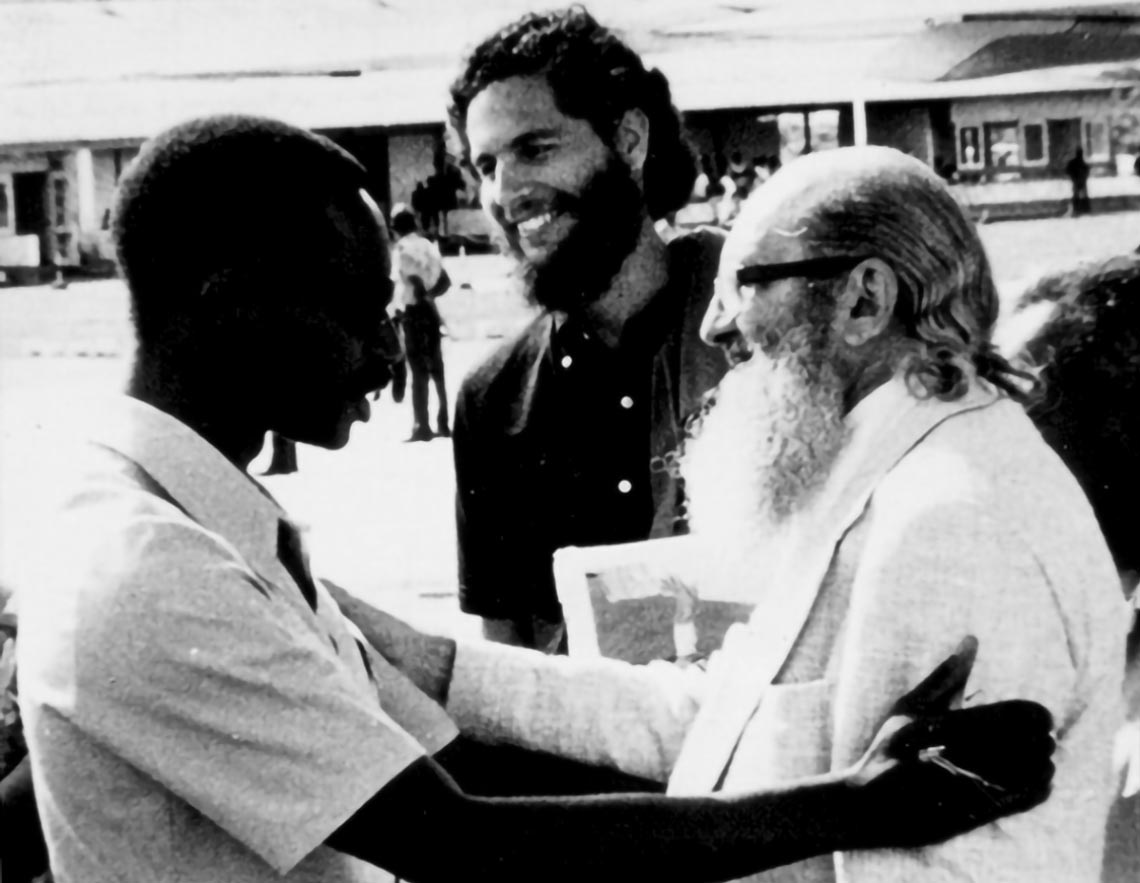
Paulo Freire Institute
Arriving in Guinea-Bissau, where he developed an adult literacy project in the 1970sPaulo Freire InstituteGajardo, from FLACSO, who was Freire’s student and partner in several projects, says that by the time Freire arrived in Chile in November of 1964, the nation’s government was in the process of instating an agrarian reform and transforming its educational system, adopting policies to educate young people and adults. Freire began working at the Agricultural Development Institute (INDAP), linked to the Ministry of Agriculture, on a project whose goal was teaching small growers to read, write, and do basic math. “Reading and calculus were fundamental skills to help these individuals develop new forms of production and coexistence. Freire then adapted his methodology to the situation in Chile,” shares Gajardo, who authored a book in 2019 on the educator’s career in Chile. In her view, it was at that moment, when Freire was exposed to theories by Marxist thinkers, that he transformed his initial approach—to help young people and adults achieve literacy and develop a critical view of reality—into a different one: encouraging the development of political groups, such as student federations, institutes for informal education of workers, and strategies for training and research on agrarian reform. “In 1966, I was a student movement leader at the Catholic University of Chile. I was exposed to Freire’s ideas when looking for methodologies that could improve the education of marginalized urban populations,” she shares, pointing out his active participation in public conferences and seminars in different parts of the country.
Freire went on to collaborate with the student federation in Chile and advised Gajardo on her master’s dissertation. In 1967, through a contract with the United Nations Educational, Scientific and Cultural Organization (UNESCO), he was asked to become an international consultant at a Chilean institute that was developing training strategies as part of the agrarian reform. He worked there until the following year when UNESCO announced that the partnership would be discontinued. According to Gajardo, this was a huge blow for Freire—who, by that point, had made several friends and settled into the country with his family. “The contract was not renewed because the Chilean government believed his method caused rural and urban marginalized populations to become radicalized,” she explains, pointing out that Freire recounts this event in his book Pedagogy of Hope (Paz e Terra, 1992). Although he was unsuccessful in his work there, Gajardo believes Freire’s experience in Chile made his views more globalized. This was when he wrote the book Pedagogy of the Oppressed, first published by Herder and Herder in 1970 in the United States.
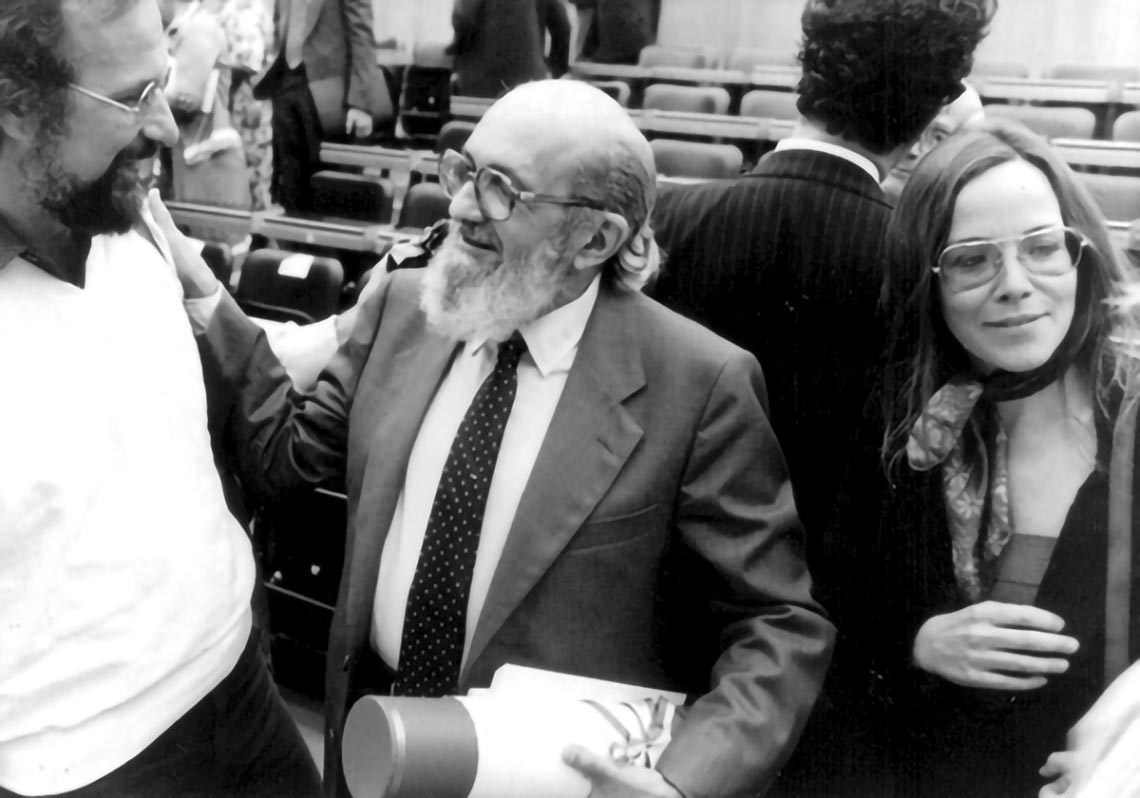
Paulo Freire Institute
Receiving honorary PhDs: left, at the University of Geneva, in 1979…Paulo Freire InstituteIn 1968, Freire was asked to join Harvard University as a visiting professor, where he remained for a year and was able to present his ideas to academics who were interested in innovating and experimenting in the field of pedagogy. “Throughout his career, he found many favorable circumstances for the development of his pedagogical and philosophical thinking, born from his experience as an educator,” says Gajardo. In 1970, Freire joined the WCC Department of Education in Geneva, Switzerland. In 1975, he began working in Guinea-Bissau and Cape Verde, recently freed from the Portuguese colonial regime; he would develop projects that focused on recovering African traditions, as well as literacy and schooling programs. Despite his encouragement of the autonomy of these nations, Maurilane de Souza Biccas—from the University of São Paulo School of Education (FE-USP)—explains that Freire was criticized for developing literacy projects in Portuguese, the colonizer’s language, and not in local languages.
Freire finally returned to Brazil in 1980, after 16 years in exile. In 1989, during Luiza Erundina’s mayoral administration, he became Secretary of Education in the city of São Paulo. “Freire implemented a project that went beyond a method for teaching literacy: it incorporated the principles of his pedagogical thinking into the city’s education policy,” according to biologist Antonio Fernando Gouvêa da Silva, from UFSCar, who has been studying Freire’s work for over 20 years and is also a member of the Paulo Freire Study Group at UFSCar. Thus, ideas such as the decentralization of the teaching-learning process, the communication between teachers and the school community, and the appreciation for the student’s culture were central to his administration and the development of the Youth and Adult Literacy Movement (MOVA)—his effort to fight illiteracy among young adults and adults throughout the city.

Paulo Freire Institute
… and at the Complutense University of Madrid, in 1991Paulo Freire InstituteIn his 2019 biography of Freire, published by Vestígio, philosopher Walter Omar Kohan, from the State University of Rio de Janeiro (UERJ), notes that, although Freire was not a philosopher, his work is often studied by researchers in the field of philosophy of education, insofar as it reflects on educational processes and teaching methods. In the book, Kohan writes that studies in Brazil and abroad “try to pinpoint Paulo Freire’s philosophy, or the philosophical assumptions that place his ideas within a certain philosophical approach. Scholars have found a few different influences in his theoretical formulations, including Marxism, liberation theology, existentialism, and critical pedagogy. “A central issue in his intellectual journey is educating as a political act,” says Kohan, pointing out that literacy initiatives are inseparable from the idea of forming citizens.
Applied linguist Wagner Rodrigues Silva, from the Federal University of Tocantins (UFT), Palmas campus, highlights the scope of Freire’s concept of literacy, from understanding the language system to social issues that involve the use of language. In this sense, he points out that Freire’s method is used alongside other, more traditional methods of teaching adults and children to read and write, involving the memorization of syllables or syllabic families. “Teachers must have the autonomy to choose and combine methodologies according to the profile of their students, but this demands a consistent linguistic training, which education degrees do not always provide,” he says. According to the Brazilian Institute of Geography and Statistics (IBGE), in 2018, Brazil’s illiterate population aged 15 or older was 11.3 million, or 6.8% of the general population.
According to sociologist and political scientist of education Carlos Alberto Torres, of the School of Education and Information Studies (GSEIS) and director of the Paulo Freire Institute at the University of California in Los Angeles (UCLA) in the United States, Freire is considered to be the founding father of critical pedagogy, an approach that sees education as an element of intellectual and moral formation, but also of social transformation. Torres highlights that Freire received more than 40 honorary PhDs.
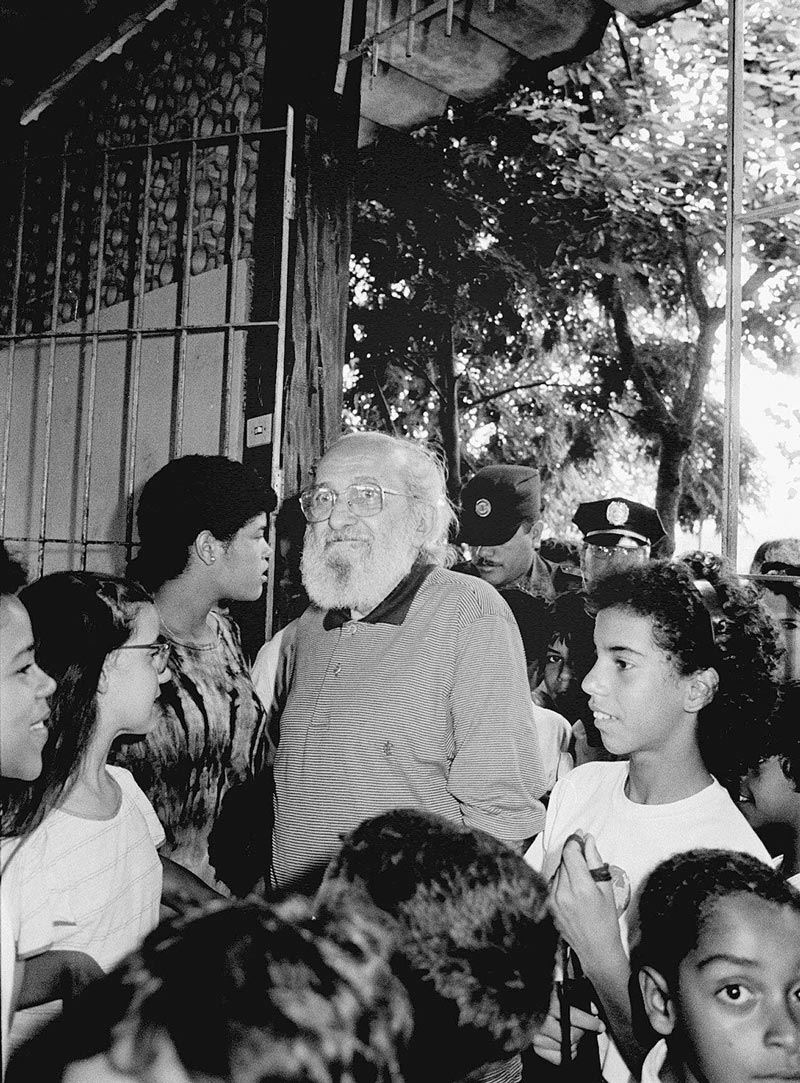
Matuiti Mayezo / Folhapress
As Municipal Secretary of Education, Freire visits a public school in Vila Madalena, a São Paulo neighborhoodMatuiti Mayezo / FolhapressHaving been close in the final years of Freire’s life, Torres recalls Freire saying he wished he had written a fifth chapter to Pedagogy of the Oppressed, reflecting on the concept of ecopedagogy—an educational model that focuses on the sustainable development of the planet. Translated into more than 45 languages and with 40 editions in English, Torres considers Pedagogy of the Oppressed to be Freire’s most important piece of work. “It is the third most cited book in the world in social science research, and the most cited in pedagogy,” he shares, referring to a 2016 survey conducted by the London School of Economics involving data from Google Scholar.
With his more than 30 books, translated into about 50 languages, Freire was the subject of 3,000 theses and dissertations in Brazil by 2017. Despite these numbers, Biccas, from FE-USP, claims there are still aspects of his life and work that are underexplored, such as the surveillance he was under by the military dictatorship (1964–1985) when he was in exile. “There is a large amount of correspondence about this period in the archives of the Department of Political and Social Order [DOPS], stored in the Public Archive of the State of São Paulo; it warrants a deeper analysis,” she says. In addition, the Paulo Freire Institute in São Paulo, which houses the educator’s estate, contains potential sources for new research, such as audio recordings of lessons and Freire’s personal library. “There is a lot of material about Freire scattered out there, which should be organized and catalogued in a memorial,” defends Biccas, who leads the activities of the Ano 100 com Paulo Freire (Year 100 with Paulo Freire), which is taking place this year at FE-USP and involves lectures, debates, workshops, and an international seminar.
Finally, in analyzing the historical reception of Freire’s ideas, Brayner, from UFPE, maintains that his ideas underwent a process of institutionalization, causing him to “lose his original subversive impulse.” This is because his project to educate rural illiterate adults became a university discipline, meaning it has been organized and standardized. “As a result, today in the universities, Freire’s work does not generate efforts to educate people, but rather discourse on educating people. Once his ideas became institutionalized, it became harder to look at his legacy from a critical standpoint,” he concludes.
Books
GAJARDO, M. Paulo Freire – Crónica de sus años en Chile (Paulo Freire – A chronicle of his years in Chile) (E-book). Chile: Flacso, 2019.
KOHAN, W. Paulo Freire mais do que nunca: Uma biografia filosófica. (Paulo Freire more than ever: A philosophical biography) Belo Horizonte: Vestígio, 2019.
HADDAD, S. O educador: Um perfil de Paulo Freire. (The educator: A profile of Paulo Freire) São Paulo: Todavia, 2019.
TORRES, C. A. First Freire. New York: Teachers College Press, 2014.
